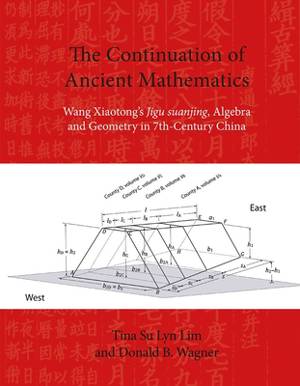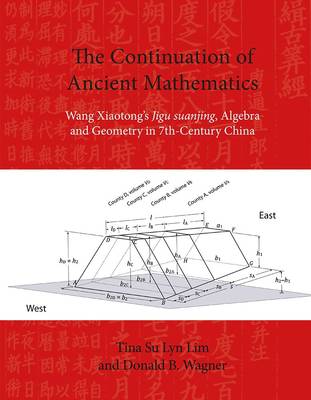
- Afhalen na 1 uur in een winkel met voorraad
- Gratis thuislevering in België vanaf € 30
- Ruim aanbod met 7 miljoen producten
- Afhalen na 1 uur in een winkel met voorraad
- Gratis thuislevering in België vanaf € 30
- Ruim aanbod met 7 miljoen producten
Zoeken
The Continuation of Ancient Mathematics
Wang Xiaotong's Jigu Suanjing, Algebra and Geometry in 7th-Century China
Tina Su-Lyn Lim, Donald B Wagner
€ 33,95
+ 67 punten
Omschrijving
After the collapse of Roman civilization, knowledge of mathematics dwindled in Europe. In the Arab world, however, the works of ancient mathematicians like Euclid were preserved and built upon by new thinkers like al-Khwarizmi, who became instrumental in spreading Indian mathematics and numerals to the West. Little known to Western historians, a parallel development of mathematical knowledge was happening in China. A rare glimpse of this world is offered via a translation and elaboration of one of the canons of classical Chinese mathematical education. Wang Xiaotong's Continuation of ancient mathematics shows us a stage in the development from the 1st to the 14th century CE of the Chinese traditional algebra of polynomials. Here in the 7th century, columns of numbers used in root-extraction procedures are recognized as equations that can be solved numerically, but these equations cannot yet be manipulated. Wang Xiaotong arrives at numerically solvable polynomials through a variety of ad hoc techniques, including geometric constructions and rhetorical algebra. In the 18th century, it would be shown that all of his problems could be solved by straightforward algebraic manipulation of polynomials using 14th-century Chinese methods. Lim and Wagner's in-depth study of the Continuation brings this work to an audience unfamiliar with the history and particulars of Chinese mathematical knowledge. Their worked examples also illuminate the text and invite comparison with the work of medieval mathematicians in the Middle East and Europe. The work will appeal to historians of mathematics especially but anyone interested in the evolution of Chinese science and technology will also find this very informative.
Specificaties
Betrokkenen
- Auteur(s):
- Uitgeverij:
Inhoud
- Aantal bladzijden:
- 200
- Taal:
- Engels
- Reeks:
Eigenschappen
- Productcode (EAN):
- 9788776942175
- Verschijningsdatum:
- 30/06/2017
- Uitvoering:
- Paperback
- Formaat:
- Trade paperback (VS)
- Afmetingen:
- 213 mm x 267 mm
- Gewicht:
- 566 g

Alleen bij Standaard Boekhandel
+ 67 punten op je klantenkaart van Standaard Boekhandel
Beoordelingen
We publiceren alleen reviews die voldoen aan de voorwaarden voor reviews. Bekijk onze voorwaarden voor reviews.








